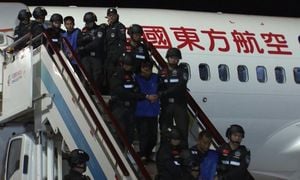Iran has taken decisive action against U.S. pressure with the impending return of Mehdi Kiasati, who has been embroiled in controversy due to allegations of sanction evasion. Kiasati is expected to arrive back in Iran shortly, following diplomatic interventions by Iranian authorities.
Kazem Gharibabadi, Iran's Deputy Foreign Minister, announced via the social media platform X, "The Iranian citizen, Mehdi Kiasati, for whom the United States requested extradition from the Netherlands on charges of evading sanctions, will reject the extradition request and return to Iran within hours." This marks another episode of geopolitical tension where the Iranian government has stood firm against U.S. demands.
Interestingly, prior to Gharibabadi's announcement, the Dutch Foreign Minister, Kasper Woldkemp, acknowledged engaging with Iranian Foreign Minister Abbas Araqchi over various topics, including Middle Eastern dynamics and the Iranian nuclear file. Though he did not directly refer to Kiasati, he confirmed discussions took place surrounding pressing issues affecting the region.
The case of Kiasati highlights Iran's broader strategy of defiance against Western pressures. Having previously facilitated the release of Kiasati through diplomatic channels, Gharibabadi had engaged with Francescos Johan Maria Molen, the Dutch Ambassador to Iran, advocating strongly for Kiasati's cause when he served as Secretary of the Iranian Human Rights Committee. Gharibabadi stated, "I spoke with Francescos Johan Maria Molen to advocate for the release of this Iranian citizen." His persistence reflects the Iranian government's commitment to protecting its citizens abroad.
Kiasati's return is emblematic of Iran's stance to push back against perceived external interventions. With continuing geopolitical shifts, Iran remains steadfast, asserting its rights over its citizens and shrugging off U.S. interventions.
Looking forward, the routine cycles of diplomatic exchanges are likely to continue, with Iran's foreign policy remaining focused on sovereignty and the rejection of foreign directives. Analysts suggest this situation could keep tensions high as talks around Iran’s nuclear program and regional peace efforts persist.
While Kiasati's specific accusations revolve around sanction evasion, they are merely the surface of more complicated issues tied to international relations, sanctions, and Iran's security strategies. The backdrop of the region's instability sets the stage for Kiasati's case, as diplomatic channels between the two nations struggle to find common ground.
Gharibabadi's remarks about Kiasati not just rejecting the extradition request but returning to Iran could also be interpreted as Iran's willingness to reinforce its territorial integrity and judicial sovereignty. It’s possible Iran will use this case as leverage against future U.S. pressures, reinforcing its narrative of foreign interference.
Despite the fluctuated circumstances, Iran’s unwavering commitment to its citizens remains evident. The refusal to comply with the U.S. extradition request sends strong signals to domestic and international audiences alike. Iran continues to navigate the murky waters of international diplomacy, striving to maintain its stance without yielding to external pressures.
Overall, the return of Mehdi Kiasati signals not only individual victory against extradition but symbolizes Iran's broader approaches toward handling international scrutiny and intervention. Observers will undoubtedly be watching how this event plays out against the backdrop of Iran's contentious relations with the United States, which appears far from resolved.



